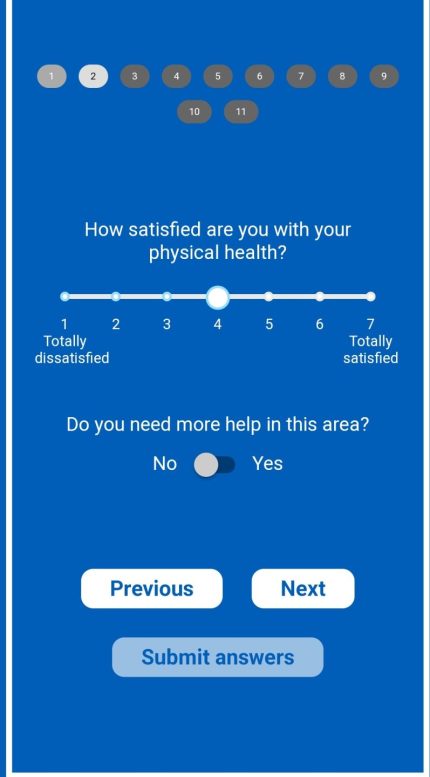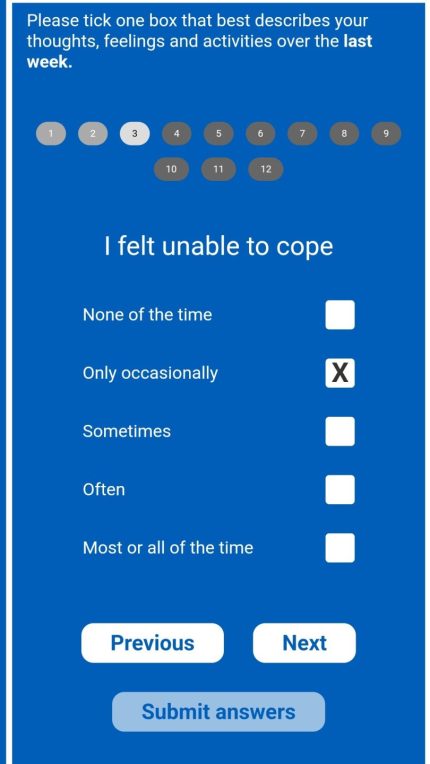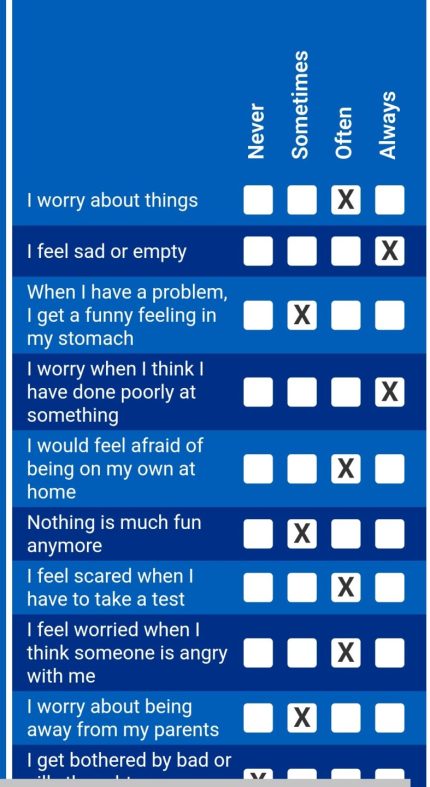Frequently asked questions
What are PROMs?
Patient reported outcome measures (PROMs) are a way for you to tell us about your health, wellbeing and quality of life. They help us monitor your progress and recovery, and help us understand how well your care and treatment is going. They can also be used to:
1. Help you and your healthcare team decide what care is best for you
2. Help us improve the services and care we provide
3. Help us plan future service improvements.
Most of the PROMs questionnaires we use are quite short and simple. You won’t need to write out long responses or give too much detail. Just choose an answer that most reflects how you have been feeling recently.
PROMs are very personal. Two people giving the same answer for the same question might mean two very different things. There are no wrong answers so just try to be as honest as you can when completing the PROMs.
Why are they being introduced now?
This is part of a wider programme to use technology to help improve the health and wellbeing of people that use our services. You may have completed an outcome measure on paper before, but as part of this new programme we are starting to use digital devices to collect your outcome data. This means your healthcare worker will be able to see your completed questionnaire almost straight away, and can discuss the answers you give with you, and compare them with previous answers you may have given.
How will it work?
In time, everyone that uses our services will be invited to complete an electronic questionnaire about their health. For now, this is being rolled out in phases.
The process will be automated as much as possible. You may receive a text message ahead of an appointment with a link to an outcome questionnaire, or you may be asked to complete a PROMs during your clinic appointment. If this is the case, your healthcare worker will discuss your answers with you during your visit. If you have a telephone appointment, your healthcare worker may also send you an email or link to your smartphone during the telephone call to get more information about how you are feeling.
If you are sent a text or email, it will contain a link to a website address for you to access the PROMs questionnaire. The link is unique, and that link will expire once you have completed the questionnaire. You will also be asked to record your date of birth before you start to complete the questionnaire so that we know it is you.
You may be asked to complete the same questionnaire at different points in time to see how your health and wellbeing is changing. By measuring quality of life and quality of care over time, you and your healthcare team can work together to help make a meaningful and lasting difference to your wellbeing. Normally we won’t ask you to complete an outcome measure more than three times in a year, but we may ask you to complete an outcome if there is a change in how you are feeling or your care finishes and you are discharged.
What if I don’t have a smartphone?
There are lots of ways that you can complete the PROMs. If you don’t have a smartphone, we may be able to send you an email with the link in it. If you do not have access to the internet, we may ask you to complete a PROMs next time you attend an appointment. Your healthcare worker will be able to bring up the questionnaire on a laptop or mobile device and help you to complete it.
If you do not have access to a digital device, if you don’t want to or are not able to complete the questionnaire, this will not delay your appointment or impact on the care you will receive.
What if I am unable to answer the questionnaire myself?
Some people may not be able to complete the questionnaire themselves. This could be for a number of reasons, but we would still like you to tell us about how you are feeling. If you are unable to complete the questionnaire yourself, you may want to ask a family member, friend or carer to help you. If there is someone who will be able to assist you in completing the questionnaire, please make sure the answers you provide are your own, and not those of the person helping you.
If you are attending a clinic appointment, your healthcare worker may bring up the questionnaire on a laptop or mobile device. It is important that you are given the opportunity to complete the questionnaire without being observed by staff. However, a member of staff may demonstrate the use of the hand-held device to you, or a family member or friend, and answer any questions that you may have. If you require assistance completing the questionnaire, staff should be able to go through it with you.
If you are still unable to complete the questionnaire after you have considered the above, please be reassured that this will not delay your appointment or impact on the care you will receive.
Is the questionnaire available in other languages?
The questionnaire is only available in English at the moment. We are looking at how we make digital PROMS accessible to a wide range of people who use our services. We will aim to do this before PROMs are rolled out more widely.
A family member or friend may be able to help you complete the PROMs. If you are not able to complete the questionnaire at this time due to language barriers, this will not delay your appointment or impact on the care you will receive.
What happens if I choose not to take part?
Completing the PROMs questionnaire will help us better understand your current needs and ensure we provide you the best possible care, but it is not compulsory. If you do not wish to take part, please do not complete the questionnaire, and ask your healthcare worker if you can opt-out of having to complete PROMs. Should you choose not to take part, this will not impact on your waiting time or the care you will receive.
How I feel and my heath changes all the time, how can I complete the questionnaire?
We know how you feel can change on a day-to-day basis. How you feel now may be very different from how you felt yesterday or how you will feel in a few hours’ time, especially if you take medications to support your health and wellbeing.
The questionnaires are meant to give us a snapshot of your health. We know they give us a very limited view of how you have been feeling recently, but it’s important that you complete them thinking about how you feel at the time.
So, if at the time of completion you are managing your mood through medication, please respond about how you feel right now, not how you would feel if you hadn’t taken your medication.
How will the results be reported back to me and my healthcare worker?
Once you submit your questionnaire you won’t be able to save it or print it, however your responses will be immediately available to your healthcare worker.
You can ask for feedback during your appointment; although feedback will be dependent on staff accessing the information, and this may not always be possible depending on where your appointment is.
If your appointment is at a clinic, your healthcare worker will probably be able to share your answers with you and compare this with previous answers you may have given. They will also be able to talk to you about what this means. If your appointment is at home, your healthcare worker may print out your answers and share them with you.
How are the questionnaires going to be used?
Your responses will be used to help us understand the problems you are having, find out more about your health and wellbeing and quality of life, and to monitor changes in these.
The responses can help you and your healthcare team make an informed decision about what treatment is most suitable for your condition, needs and circumstances.
By filling in your answers at the beginning of your care you can get a really good idea of where you are starting from. Filling in your answers again at a later date, either during or at the end of your treatment, can be a useful record of where you are making progress and how well your treatment is working for you. Any positive change is an achievement and can give you confidence in managing your health and wellbeing. We don’t always expect to see constant improvements, as we know there are many things that can impact on a person’s health and wellbeing e.g. life events. If there isn’t a lot of change, or your ratings get lower, we might use this as a starting point to discuss making some changes to your treatment.
Whatever happens, completing PROMs over a period of time helps to build up a picture of your care. This can highlight areas that are meaningful and important to you and can be a very useful tool to help you understand the parts of your life where you need the most help, and how well the help you are getting is working.
How will my information be stored?
The information will be saved securely as part of your health record. Everyone working in the NHS has a duty to keep information about patients confidential. Only people directly involved in your care will be able to access your health record.
To help us improve services and plan for the needs of the future, once any identifiable information (e.g., name, date of birth etc.) has been removed, patient reported outcome responses from all patients may be put together to create a ‘data set’. We can use this to help understand the needs of our service users, and for service improvement and planning.
How PROMs will look on a smartphone
Below are some examples of what the questionnaire would look like when you use it on a smartphone. Please note that these are examples only and the questions may differ to those you receive.



Page last updated on: